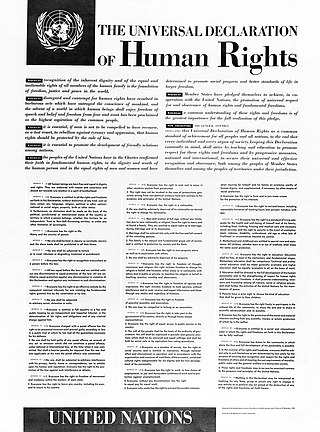
Naturalization is the legal act or process by which a non-citizen of a country may acquire citizenship or nationality of that country. It may be done automatically by a statute, i.e., without any effort on the part of the individual, or it may involve an application or a motion and approval by legal authorities. The rules of naturalization vary from country to country but typically include a promise to obey and uphold that country's laws and taking and subscribing to an oath of allegiance, and may specify other requirements such as a minimum legal residency and adequate knowledge of the national dominant language or culture. To counter multiple citizenship, some countries require that applicants for naturalization renounce any other citizenship that they currently hold, but whether this renunciation actually causes loss of original citizenship, as seen by the host country and by the original country, will depend on the laws of the countries involved.

Jus soli, commonly referred to as birthright citizenship, is the right to acquire nationality or citizenship by being born within the territory of a state.

The British Overseas Territories Act 2002 (c.8) is an Act of the Parliament of the United Kingdom which superseded parts of the British Nationality Act 1981. It makes legal provision for the renaming of the British Dependent Territories as British Overseas Territories, and the renaming of associated citizenship.

The British Nationality Act 1981 (c.61) is an Act of the Parliament of the United Kingdom concerning British nationality since 1 January 1983.
Gibraltarian status is a legal status in Gibraltar law defined by the Gibraltarian Status Act, 1962. Persons with Gibraltarian status are registered on the Register of Gibraltarians.

Swiss citizenship is the status of being a citizen of Switzerland and it can be obtained by birth or naturalisation.

Belonger status is a legal classification normally associated with British Overseas Territories. It refers to people who have close ties to a specific territory, normally by birth or ancestry. The requirements for belonger status, and the rights that it confers, vary from territory to territory.

Italian nationality law is the law of Italy governing the acquisition, transmission and loss of Italian citizenship. Like many continental European countries it is largely based on jus sanguinis. It also incorporates many elements that are seen as favourable to the Italian diaspora. The Italian Parliament's 1992 update of Italian nationality law is Law no. 91, and came into force on 15 August 1992. Presidential decrees and ministerial directives, including several issued by the Ministry of the Interior, instruct the civil service how to apply Italy's citizenship-related laws.

The primary law governing nationality of the Republic of Ireland is the Irish Nationality and Citizenship Act, 1956, which came into force on 17 July 1956. Ireland is a member state of the European Union (EU) and all Irish nationals are EU citizens. They enjoy free movement rights in EU and European Free Trade Association (EFTA) countries and may vote in elections to the European Parliament.

This article concerns the history of British nationality law.

Philippine nationality law details the conditions by which a person is a national of the Philippines. The two primary pieces of legislation governing these requirements are the 1987 Constitution of the Philippines and the 1939 Revised Naturalization Law.

Singaporean nationality law details the conditions by which a person holds Singapore nationality. The primary law governing nationality requirements is the Constitution of Singapore, which came into force on 9 August 1965.

In practice, basic human rights in the British Virgin Islands (BVI) appear to be respected. Reports of repression of freedom of speech, interference with democracy or the rule of law, and arbitrary arrest and torture are generally non-existent. The BVI have been described as "generally free of human rights abuses".
In tertiary education in the United Kingdom, the term home student is used to refer to those who are eligible to pay university tuition fees at a lower rate than overseas students. In general, British, and Irish citizens qualify for home student status only if they have been "ordinarily resident" in the UK for three years prior to the start of university. From Autumn 2021, EU citizens lost their home student status and since have had to pay the higher international tuition fees. There are other criteria to be satisfied. All other students, even British citizens, who do not qualify as "home students" are considered to be overseas students and must pay higher overseas students tuition fees at university.

A constitutional referendum was held in the Bahamas on 7 June 2016. Voters were asked whether they approve of four separate constitutional amendments. All four proposals were rejected.

Fijian nationality law details the conditions by which a person is a national of Fiji. The primary law governing nationality requirements is the Citizenship of Fiji Act 2009, which came into force on 10 April 2009.
Bahamian nationality law is regulated by the 1973 Constitution of the Commonwealth of The Bahamas, as amended; The Bahamas Nationality Act; The Bahamas Immigration Act; and various British Nationality laws. These laws determine who is, or is eligible to be, a national of The Bahamas. Bahamian nationality is typically obtained either on the principle of jus soli, i.e. by birth in The Bahamas; or under the rules of jus sanguinis, i.e. by birth abroad to a father with Bahamian nationality. It can also be granted to persons with an affiliation to the country, or to a permanent resident who has lived in the country for a given period of time through naturalisation. There is currently no program in The Bahamas for citizenship by investment. Nationality establishes one's international identity as a member of a sovereign nation. Though it is not synonymous with citizenship, rights granted under domestic law for domestic purposes, the United Kingdom, and thus the commonwealth, has traditionally used the words interchangeably.

Tuvaluan nationality law is regulated by the 1986 Constitution of Tuvalu, as amended; the 1979 Citizenship Ordinance, and its revisions; and various British Nationality laws. These laws determine who is, or is eligible to be, a national of Tuvalu. Tuvaluan nationality is typically obtained either on the principle of jus soli, i.e. by birth in Tuvalu or under the rules of jus sanguinis, i.e. by birth abroad to parents with Tuvaluan nationality. It can be granted to persons with an affiliation to the country, or to a permanent resident who has lived in the country for a given period of time through naturalisation. Nationality establishes one's international identity as a member of a sovereign nation. Though it is not synonymous with citizenship, for rights granted under domestic law for domestic purposes, the United Kingdom, and thus the Commonwealth, have traditionally used the words interchangeably.
I-Kiribati nationality law is regulated by the 1979 Constitution of Kiribati, as amended; the 1979 Citizenship Act, and its revisions; and various British Nationality laws. These laws determine who is, or is eligible to be, a national of Kiribati. I-Kiribati nationality is typically obtained either on the principle of jus soli, i.e. by birth in Kiribati or under the rules of jus sanguinis, i.e. by birth abroad to parents with I-Kiribati nationality. It can be granted to persons with an affiliation to the country, or to a permanent resident who has lived in the country for a given period of time through naturalisation. Nationality establishes one's international identity as a member of a sovereign nation. Though it is not synonymous with citizenship, for rights granted under domestic law for domestic purposes, the United Kingdom, and thus the Commonwealth, have traditionally used the words interchangeably.

São Toméan nationality law is regulated by the Constitution of São Tomé and Príncipe, as amended; the Nationality Law, and its revisions; and various international agreements to which the country is a signatory. These laws determine who is, or is eligible to be, a national of São Tomé and Príncipe. The legal means to acquire nationality, formal legal membership in a nation, differ from the domestic relationship of rights and obligations between a national and the nation, known as citizenship. Nationality describes the relationship of an individual to the state under international law, whereas citizenship is the domestic relationship of an individual within the nation. São Toméan nationality is typically obtained under the principles of jus soli, i.e. by birth in the territory, or jus sanguinis, i.e. by birth in São Tomé and Príncipe or abroad to parents with São Toméan nationality. It can be granted to persons with an affiliation to the country, or to a permanent resident who has lived in the country for a given period of time through naturalization.















